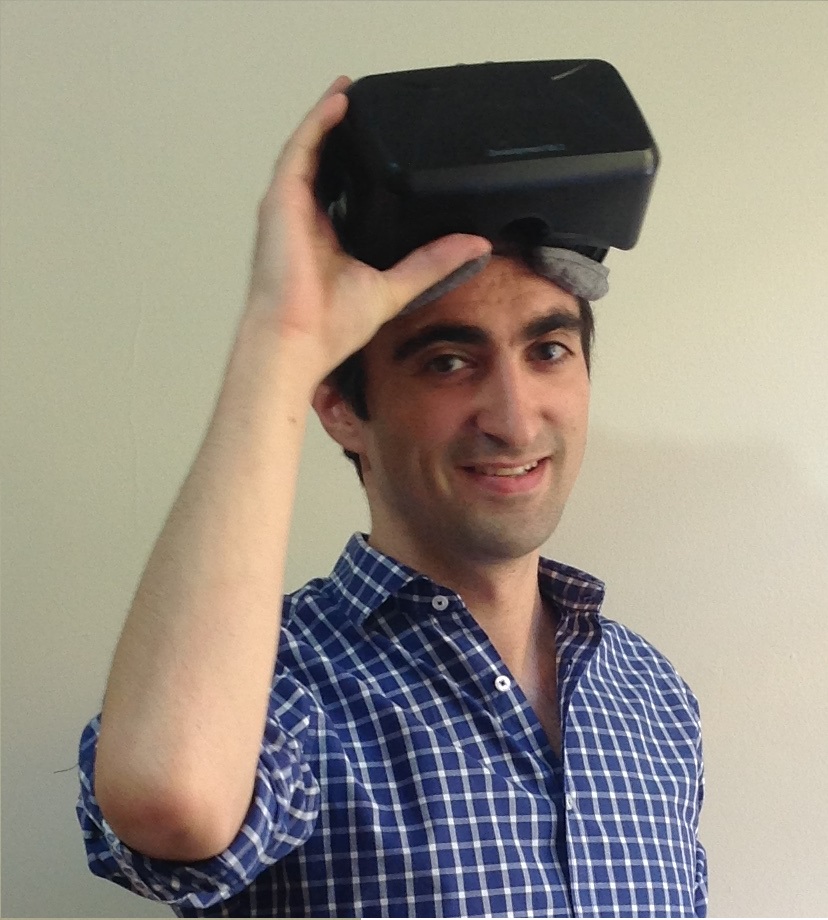Sami Hamid is a true international, born in Belgium and raised in Spain by an English mother and Iraqi father. After spending most of the past decade based in London and Shanghai respectively, opportunity brought him to Istanbul. He is presently the Director of VR First Bahçeşehir, Turkey’s first and still only virtual reality development lab, as well as a co-founder of Glitch Studios, a VR development studio with offices in Istanbul, London, and Oslo. Both roles are connected by his role as an evangelist for virtual reality and its potential applications across a range of traditional media. VR First Bahçeşehir is a joint initiative between Bahçeşehir University, and Crytek, an international game developer and creator of 3D game technology, and is located at the university’s Galata Campus. Glitch Studios are based in Levent, Istanbul and produce VR experiences for brands operating in virtually (get it?) any industry.
Sami recently sat down with Yabangee to talk about his experience as an expat entrepreneur in Istanbul, what makes the largest city in Europe such an attractive setting for those able to handle its unique challenges, and the present landscape of VR development in Turkey.

How did you come to reside in Istanbul? Was it for business, pleasure, or both?
As a 3rd Culture Kid I have always lived a nomadic life. After half a decade in London, another half a decade in Shanghai I set my sights on new opportunities and moved to Istanbul for a position in project management within a newly established university.
What made Istanbul an attractive location for you to start your venture?
I was very much of the opinion that I should move back to London or try my luck in San Francisco which was and still is the heart of VR/AR development, but Istanbul came with its own advantages. The VR/AR community was quite small out here meaning you could quickly make a name for yourself as the ‘go to’ VR evangelist allowing you to easily connect with great minds and passionate people both locally and globally. The Virtual Reality Lab opened at Bahçeşehir University and I was privileged to be hired as the Lab Director while at the same time working on a number of VR projects with a great team of VR developers. This matured finally to opening our VR Studio startup with its production hub based here in Istanbul while its sales offices are dotted around Europe. Being a bigger fish in a smaller pond is not always a disadvantage.
VR is field that has captured the popular imagination for decades, but most people still aren’t so familiar with it outside the context of science fiction. What was the route you took into the VR space? What was it that first attracted to you to VR?
At the time I had a job offer to return back to China for an opportunity I had been waiting on for quite some time. It was one of those weird crossroads we all face in life, do I go left or do I go right. I turned down the job offer and jumped head first into VR. The industry was still quite underground back in late 2014, not much chatter on the mainstream media and Meetups and events were filled with an exciting energy from like-minded passionate technophiles, geeks and hackers. It’s been coming up to three years and I haven’t looked back since!
There have been several points in my journey with VR & AR (Augmented Reality) that have all really catapulted my energy and enthusiasm for this technology to the next level. What first drew me was in was the first was the first time I tried the Oculus DKII, back in 2014, I remember putting it on and trying an experience called Surge which to this day remains one of my favourite abstract VR experiences. It reminds me of the work of Giacometti. Then there was an Apollo 11 demo, which is now a full experience. It really hit home how VR is going to change the way we learn and experience learning, especially for the younger generations. The HTC Vive Dev Kit back in 2015 blew my mind with the immersive agency one could have in VR, which before this point confined the user to a passive seated experience with very little head tracking. Just this past year, the Hololense showed me how VR, although a fantastic medium, will ultimately be eclipsed in the shadow of augmented reality that will no doubt see mass market in the next 20 years. The fast paced nature of this industry is super exciting.
What are your thoughts about foreigners setting up businesses in Istanbul. Do you have any advice to share with others looking at startup ventures in Istanbul?
It’s a tricky one and I find myself learning something new every day. Obviously do everything by the book, find yourself a reliable and trustworthy lawyer & accountant who will help you get on your feet and keep calm with the amount of bureaucratic processes one needs to jump through to get the simplest stuff done. If you don’t need to establish your company here, my advice is “don’t”. Most of Europe will allow far easier and lower cost startup environments with potential start up incentives – a lot of that is lacking in Istanbul.
What kinds of unexpected challenges did you face setting up your venture? Procedural or just anything unforeseen in Turkey or the region?
The system seems to favor those who don’t do things properly or do them in the grey, which slows you down and almost punishes you doing things by the book. Especially in the fast paced industry of software and design development which is sometimes freelance heavy. But don’t be tempted by the dark side – do everything properly or it will bite you in the ass later down the line. Funding was also a challenge at the start. Make sure you have some sort of decent cash injection. You are expected to have a larger than normal sum of money ready to go to set up a company here and you will be paying tax and all sorts of fees even before you make your first lira which again is quite different to Europe.
Unlike many ventures in Turkey that seek to involve a Turkish partner under the belief that the process is too difficult to manage without one, you don’t have a Turkish partner.
My partners and I are three foreigners. We don’t have a Turkish partner so you don’t need a local partner to make it work here, but again it comes back to my previous point; make sure you get a good lawyer & accountant who can guide you through the processes properly, from paying tax through to sorting out an employee’s SGK. The processes here are complicated and the fines are heavy so make sure you have a good guide helping you through the journey. A Turkish partner is of course helpful, but just remember that as a foreigner you will always be disadvantaged in a legal dispute with a local – so we are back again to ‘trust’!
How would you describe the state of VR in Turkey? What does the local market landscape look like?
Turkey missed out on the mobile phone industry because of a slow uptake which meant it was always a step behind other nations when it came to development. This was quite a blow to the tech industry here which prides itself as the fore-runner in terms of software development for the MENA region. Turkey has a huge population of highly talented software developers and engineers and that number is growing exponentially through educational and startup initiatives and investment.
Turkey, from a governmental and industry perspective, is very firm on not missing the boat with 3D printing, AR and VR. It’s ensuring that there is proper infrastructure in place, from incubation spaces, investment opportunities, both in the private and public sector, as well as education initiatives to push as much talent as possible towards a successful launch in these new tech areas.
There are quite a few all-out VR game initiatives that are coming out of Turkey, some of which you can already find on Steam, such as Hat Trick Header to Void Runner to Smell of Death. But, the far majority of development is for brands. Sadly, there is still a slight ‘catch up’ being played with branded VR experiences that seem to still be in the “Rollercoaster/ride a bike” level of VR immersion. VR developers are nearly 100% domestic in Turkey. We at Glitch for example won’t turn away a local client but don’t focus any energy in business generation within Turkey.
2016 ended up being pretty full of unexpected events across the region. Turkey of course saw the failed coup attempt over the summer and the Brexit vote certainly shook many established outlooks on the European Economic Area. What kinds of effects have recent uncertainties had on your business?
With regards to the local uncertainties in Turkey, because we only work with foreign clients, mainly in Europe we are not seeing a negative effect on our bottom line. However we have noticed a shift in the general economic and hiring climate here in Turkey. Talent who typically freelance are looking for full-time jobs right now to weather this uncertain period. As well, a weaker lira makes selling into Europe while producing in Turkey more lucrative.









